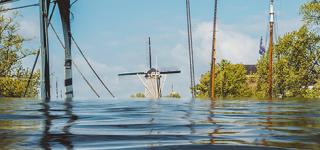
Program coordination by Nivel expert professor Michel Dückers, PhD
Program coordination by Nivel expert professor Michel Dückers, PhD
 At some point in life anyone can be confronted with events or circumstances in their social and physical living environment that will have consequences for their health. We will have to be alert to the possible impact on public health of 'what may go wrong'.
At some point in life anyone can be confronted with events or circumstances in their social and physical living environment that will have consequences for their health. We will have to be alert to the possible impact on public health of 'what may go wrong'.
In addition, we should prepare as much as possible for the challenges that individuals, professionals, organizations, the healthcare system and the society will face in such situations. With its research Nivel contributes to sharpen this focus.
The Dutch Safety Regions Act states that governments and healthcare institutions are responsible for disaster relief and crisis management. They must be prepared for the consequences of disasters, crises or terrorist attacks.
This calls for attention to limiting health damage to victims, relatives and care providers keeping an eye on short and long-term effects; being aware of the formative assistance that is needed at certain times.
Disasters and threats to human health do not abide by national borders. In this research program we actively collaborate with colleagues abroad, in the context of several international projects and publications with a focus on disasters and infectious diseases.
We investigate how governments, healthcare institutions and other organizations fulfill their responsibility for disaster and crisis management, as laid down in law, with a focus on public health.

In this research we combine severlas point of focus:
Focus on health consequences of disasters: for several years we have been monitoring the health of the victims of disasters with high national impact in the Netherlands: the fireworks disaster in Enschede, the café fire in Volendam (both Dutch city’s). Furthermore we did research on events and disasters with a high local impact: the shooting incidents in the Dutch cities of Utrecht and Alphen aan den Rijn, the long-term soil remediation of a former asphalt factory in the municipality of Olst-Wijhe and the gas quakes in Groningen.
Focus on living environment and health risks: we continuously conduct research into people's living environment and its impact on their health. In doing so, we use the data from the Nivel Primary Care Database and we deploy our various panels. With our research we inform and support policymakers and care and service providers. Examples of health risks we investigate are:
Core questions of our research:
For many threats, the issue is not so much 'if' they will actually occure, but rather ‘when’ they will occure. Therefore it’s essential to be alert and prepaired
The research results and advice that we provide are are of value to of public health services, ministries and local and international governments, in tackling (potential) crises with a public health dimension. By working together we safeguard the connection with science, policy and practice.
When there is a concrete issue, we work together with specific authorities.
All our research is driven by a societal concern:

Because of the many different interests of those involved in a disaster or threat, our research and its translation to practically feasible solutions is a complex.
On the one hand there are the more everyday exposure issues where a focus on on the instant health interests and economic interests is needed. On the other hand there are the large-scale threats, such as disasters and infectious disease outbreaks, where coordinated collective action is crucial. Therefore collaboration with stakeholders is crucial.
The team of Nivel researchers on the research program Disasters and Environmental Hazards consists of:
For more information on (conducting research together with Nivel in) this specific area of expertise, please feel free to contact our expert and program coordinator Michel Dückers (on the right).
Want to receive a notification of each news item published online on our website? Please subscibe to our newsletter.
We look forward to getting in touch with you.